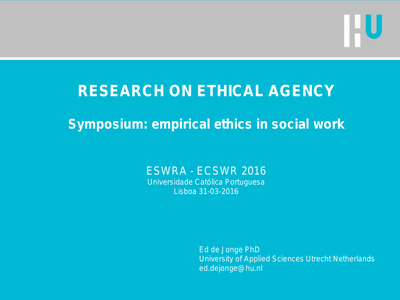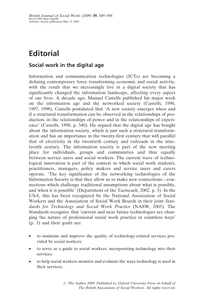Symposium ESWRA - ECSWR 2016: empirical ethics in social work. Objective: ethical aspects of social work (esp. at home) Structure: cooperation of the research group of UAS Utrecht Netherlands with six regional welfare organizations Method: practice based ethics research Focus on professional practice: learning from moral experiences in frontline practice (cf. Van Doorn, 2008) Hybrid approach: combining theoretical resources and professional practice (cf. Banks & Gallagher, 2009) Mixed methods: desk research, interviews, best practice units (BPU), development of ethical tools
DOCUMENT

Inleiding op een themanummer van British Journal of Social Work over sociaal werk in de digitale samenleving.
DOCUMENT

Background The global nursing shortages exacerbated by the COVID-19 pandemic necessitated a drastic reorganization in nursing practices. Work routines, the composition of teams and subsequently mundane nursing practices were all altered to sustain the accessibility and quality of care. These dramatic changes demanded a reshaping of the nurses’ work environment. The aim of this study was to explore how nurses reshaped their work environment in the early stages of the COVID-19 pandemic. Methods A descriptive study comprising 26 semi-structured interviews conducted in a large Dutch teaching hospital between June and September 2020. Participants were nurses (including intensive care unit nurses), outpatient clinic assistants, nurse managers, and management (including one member of the Nurse Practice Council). The interviews were analysed with open, axial, and selective coding. Results We identified five themes: 1) the Nursing Staff Deployment Plan created new micro-teams with complementary roles to meet the care needs of COVID-19 infected patients; 2) nurse-led adaptations effectively managed the increased workload, thereby ensuring the quality of care; 3) continuous professional development ensured adequate competence levels for all roles; 4) interprofessional collaboration resulted in experienced solidarity, a positive atmosphere, and increased autonomy for nurses; and, 5) supportive managers reduced nurses’ stress and improved work conditions. Conclusions This study showed that nurses positively reshaped their work environment during the COVID-19 pandemic. They contributed to innovative solutions in an environment of equal interprofessional collaboration, which led to greater respect for their knowledge and competencies, enhanced their autonomy and improved management support.
LINK
Background The global nursing shortages exacerbated by the COVID-19 pandemic necessitated a drastic reorganization in nursing practices. Work routines, the composition of teams and subsequently mundane nursing practices were all altered to sustain the accessibility and quality of care. These dramatic changes demanded a reshaping of the nurses’ work environment. The aim of this study was to explore how nurses reshaped their work environment in the early stages of the COVID-19 pandemic. Methods A descriptive study comprising 26 semi-structured interviews conducted in a large Dutch teaching hospital between June and September 2020. Participants were nurses (including intensive care unit nurses), outpatient clinic assistants, nurse managers, and management (including one member of the Nurse Practice Council). The interviews were analysed with open, axial, and selective coding. Results We identified five themes: 1) the Nursing Staff Deployment Plan created new micro-teams with complementary roles to meet the care needs of COVID-19 infected patients; 2) nurse-led adaptations effectively managed the increased workload, thereby ensuring the quality of care; 3) continuous professional development ensured adequate competence levels for all roles; 4) interprofessional collaboration resulted in experienced solidarity, a positive atmosphere, and increased autonomy for nurses; and, 5) supportive managers reduced nurses’ stress and improved work conditions. Conclusions This study showed that nurses positively reshaped their work environment during the COVID-19 pandemic. They contributed to innovative solutions in an environment of equal interprofessional collaboration, which led to greater respect for their knowledge and competencies, enhanced their autonomy and improved management support.
LINK
A model of work-related learning based on intentionality and developmental relatedness is proposed here. A shift is called for from an educational perspective on work-related learning to a non-educational perspective in which learning is construed as largely implicit and spontaneous. That is, work-related learning can happen both deliberately and spontaneously as direct or indirect result of work-related interactions. Work-related learning often occurs in messy real life situations, is influenced by various power and social relations, and results in individual learning outcomes as well as shared understandings. The proposed model can help HRD professionals better understand how learning and work are interrelated. It can also help such professionals take individual and work characteristics more carefully into consideration.
DOCUMENT
Article about social work and social policy in the Netherlands. It gives information about the background, history, the meaning of the profession and the different types of professional areas in which the profession is divided. Other subjects are: social work curricula, the European dimension of social work an current challenges for social professionals in the Netherlands.
DOCUMENT

Article about social work and social policy in the Netherlands. It gives information about the background, history, the meaning of the profession and the different types of professional areas in which the profession is divided. Other subjects are: social work curricula, the European dimension of social work an current challenges for social professionals in the Netherlands.
DOCUMENT

The central aim of this thesis was to increase understanding of designing vocational learning environments at the school–work boundary. Four studies were conducted, focusing on learning environment designs at the school–work boundary and on design considerations of the actors involved in their construction, both from the world of school and the world of work.
DOCUMENT

Presentation at the European Conference for Social Work Research, Leuven: Belgium
DOCUMENT

In solving systemic design challenges designers co-create with professionals from various fields. In the context of innovation in healthcare practices, this study investigates design abilities that healthcare professionals develop by participating in co-design projects. We conducted a mixed-methods research approach consisting of five retrospective interviews with healthcare researchers involved in co-design projects, and a multiple case study (three cases) on the collaboration between design researchers and healthcare professionals. The three cases all aimed at designing tools for healthcare innovation. The cases differ in the healthcare context and the professionals involved: Paediatric physical therapists in the treatment of babies (0-2 years), supervisors (e.g. in assisted living) of people with intellectual disabilities, and academic researchers in social sciences and design research developing e-health applications for elderly people with early stages of dementia. Literature states that healthcare professionals may be competent in specific abilities related to design, but they are not trained to mode-shift and to use two different ways of working for creativity. We found that the healthcare professionals involved in co-design projects developed design ability over time, and that the research setting was supportive. Based on design abilities that the five healthcare researchers explicated in the interviews as having adopted, we suggest eight mode-shift practices related to design, which we investigated in the cases. Findings of the case-study show that two mode-shift practices related to design and innovation are difficult to adopt for healthcare professionals: Generate and synthesize; and keeping track on overview and details. These two design abilities require more training and/or experience than the other six design abilities that ran smoothly in the cases, if healthcare professionals were facilitated in the process. Healthcare professionals specifically relate two of these practices to design: Collaboration and slow down – sprint. This study discusses these findings by referring to an analogy of kayaking on a wild water river: The collaboration aspect of switching between working in a group and by yourself, like a group of kayakers who collaborate in going down stream a river but peddle by themselves in their own boats; the slowdown and sprint aspect, like kayakers who oversee the river in turning waters and sprint in between, rather than go with the flow in a raft.
DOCUMENT
